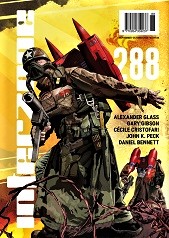 Interzone #288, September/October 2020
Interzone #288, September/October 2020
“Time’s Own Gravity” by Alexander Glass
“Soaring, The World on Their Shoulders” by Cécile Cristofari
“A Distant Hum” by John K. Peck
“Captured Dreams of The Dead Machine” by Daniel Bennett
“War Suit” by Gary Gibson
Reviewed by Chuck Rothman
Interzone had been around a long time, but continues its history of first-class stories with the September/October issue.
“Time’s Own Gravity” by Alexander Glass is about dealing with a dangerous threat: invisible creatures that travel from place to place, feeding on time. Anything it touches immediately ages. Carl and Ginny have to escape it and find themselves face to face with Lukasz, the inventor of a source of cheap energy that may have unleashed the time creatures. Fascinating concept—I especially like the targeting of the effects to only where it actually touched. I think the only flaw is that the ending is just a speculative revelation instead of being more dramatic and direct.
Cécile Cristofari‘s “Soaring, The World on Their Shoulders” is the story of Madam Santucci, a scientist who is working on some genetic engineering in a military society. The military wants her to create weapons, but she has her own agenda, based upon a cliff where swifts make their nests. I found her a very appealing character and her dedication admirable, but the ending is far too futile and nihilistic for my taste.
“A Distant Hum” by John K. Peck is set in a world where everything is in poor shape. Z appears to be a thief working with Drava, who provides the technology for what seems to be a mission to grab some worthless items at a warehouse, only she doesn’t. I had a hard time figuring out what was supposed to be going on; the narrative is disconnected and not very engaging.
“Captured Dreams of The Dead Machine” is set in a future where a computer virus had destroyed all data. Ash works in a museum that gathers up what managed to survive, but discovered it was far more lucrative to sell these to collectors. On this day, he leaves the museum to purchase another valuable artifact from an old man, when they are interrupted by a gang out to rob him. Daniel Bennett creates a picture of a lawless future as he describes the incident, but it doesn’t amount to much overall other than saying that people in a dystopia are dystopian.
I’m not a big fan of military SF, but “War Suit” by Gary Gibson shows a different take on it. Arvio is a scavenger in a war-torn world, being hunted by a Track-and-Kill device that won’t give up until he’s dead. Seeking shelter, he hides in a derelict robot soldier called a Golem and discovers that it’s still functional and that its AI—based on its pilot’s personality, Jane Arctor—might be willing to take him to safety. Jane’s body was cloned to be both AI and pilot of the machine. If killed, her original self survives, but may not have the memories of her life as the Golem. The story moves from the usual battles and escapes of military stories and concentrates on the philosophical implications of the situation. Its never dull, though. The battle scenes are mixed with a discussion of the issues involved. Highly recommended.
Overall, this is an excellent collection of stories. (I will also say that the graphic design is some of the best I’ve seen in a while.)
Chuck Rothman’s novels Staroamer’s Fate and Syron’s Fate are available from Fantastic Books. He blogs at greatbutforgotten.blogspot.com